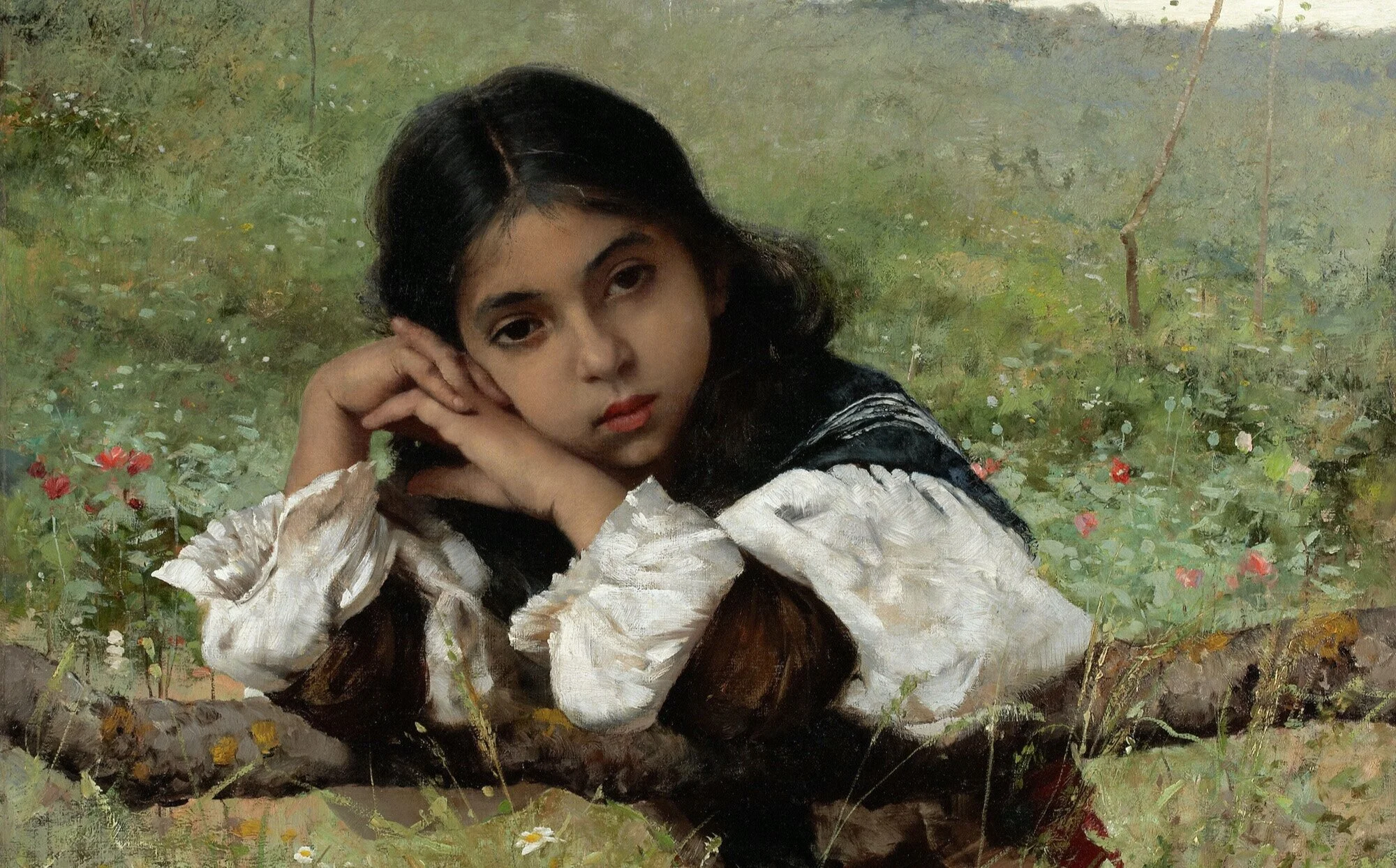When someone asks me why God allows COVID 19 ...
Charles Sprague Pearce Moments of Thoughtfulness, 1882
The question is the same, differing only in the example of suffering weighing on the person's mind: “Why does God allow suffering?” It has been posed to me countless times over the years and once again I am reminded of just how inadequate my own knowledge is of what God should and should not permit. More times than I can remember, the person asked it more to make a point than to expect an answer, confident I had none.
Others ask the question in despair. The pain I see in their eyes leaves me wondering what I could possibly say that could help them.
I suffer from an affliction described as "thinking", especially at night when I should be sleeping. I have been a victim of this sleep-depriving ailment for a good chunk of my life. Many nights my wife has ordered me, "Stop thinking and go to sleep!" I wish I knew how to do that, but when one thinks long enough about difficult things, interesting thoughts slowly rise to the surface. Here are some of mine when I am asked why God allowed COVID-19.
When we ask the question as to why God allows this or that, we need to remember that we are dealing with a being whose name is I AM -- a name that describes one who transcends time and for whom the past, present, and future are all the same. We should expect, therefore, that God makes decisions on the basis of a complex interacting web of cause and effect that interlaces all of time. Why should you or I think any mere mortal should be in a position to know what God should cause or permit in this world?
When we ask the question as to why God allows this or that, we need to remember that we are dealing with a being whose name is I AM -- a name that describes one who transcends time and for whom the past, present, and future are all the same.
As an undergraduate student, I always dreaded asking my physics professors a question. Because they knew so much more than I, my questions often betrayed an embarrassing ignorance. So why would we expect that we should know what God should and should not allow? We are not talking about a university professor here, but about the one who knows the state of every quark, neutrino and photon in the universe ... the one who created the laws of physics and who is the orchestrator of history ... the one who knows the responses and decisions of billions of human individuals at any instant in history and the optimal state of affairs to actualize at any moment in time to bring about the greatest end result.
A few years ago I read the results of a recent study done in North America. I was astonished by the findings concerning what people thought the purpose of God is. The most common belief right across the full range of the population — be they atheist, agnostic, non-religious, or religious — was the same: the purpose of God is to make us happy! I found such a mind-staggering degree of self-centeredness truly phenomenal. The affluent West has a job for God — we have decided that the reason for his existence is to serve us in our pursuit of happiness by granting us wealth, good health, success, giving us what we want, and generally allowing us to live a trouble-free life.
The most common belief right across the full range of the population — be they atheist, agnostic, non-religious, or religious — was the same: the purpose of God is to make us happy!
So when a pandemic comes along, then, according to this job description, God is failing badly. And in the hubris of Western culture, we demand to know what the problem is.
At the same time, for more than half a century, our civilization has prospered; we have become impressed with our own achievements in technology and confident in our global system of wealth. To "need God" is often thought to be a weakness which we ought to move beyond if we are to progress and flourish. Consequently, we have decided in our wisdom to remove God from our governments, our schools and institutions, and all of public life. We have turned our back on God as the source of moral perfection and instituted our own ethics instead. In each case, we have replaced the wisdom of God with our own human knowledge and progressive thinking. We have convinced ourselves that we are superior to that rather superstitious notion of God, a remnant of our less knowledgeable past.
Consequently, our civilization regards God as a hired servant who is expected to stay "in his place" downstairs in the servants' quarters, showing up only when we ring the bell. He is to keep the place tidy and happy so we can indulge ourselves in whatever ways we wish.
We also assume that the objective of life is to have one that is long, happy, and trouble-free, but this life is like a vapour that dissipates in seconds in comparison to eternity. God might want us to prepare for eternity, and a lot of that preparation has to do with how we respond and mature in the events we face in this life …. and some of those events may involve great sorrow and suffering.
I have known people who would present themselves as your dearest friend when they wanted something from you, but otherwise would not bother to give you the time of day. We soon want nothing to do with such a person. Could we be that person who just uses God when we want something? So when we ask why God allows COVID-19, perhaps we should first ask why we would expect the servant to come trotting out from the servants' quarters to take away the inconvenience of COVID-19 so we can get on with our fun, our sexual obsessions, our economies, our holiday plans — none of which God is welcome to attend. Why would we not expect God to just leave us alone to fend for ourselves, like any person who knows they are just being used?
… perhaps we should first ask why we would expect the servant to come trotting out from the servants' quarters to take away the inconvenience of COVID-19 so we can get on with our fun, our sexual obsessions, our economies, our holiday plans …
I am not, for even a moment, suggesting COVID-19 is a punishment from God. It might be a wake-up call, it might be an adjustment to the trajectory of history by the Conductor of History, it could be a beautiful respite for humanity to sit back in the quietness of isolation for a while and reflect on what our priorities are and what is truly important, but I doubt it is punishment. This is a philosophical premise on my part, but punishment is not really punishment unless the recipient is aware that it is punishment and knows the reason for it. I don't see that being the case at present. I look at it as a valuable opportunity to make mid-course adjustments in my own life.
Philosophers, in academic discussions of the problem of evil and suffering in this world, generally agree that a perfectly good, all-knowing, and all-powerful God would only permit events that either prevented an even greater evil or brought about a greater good. This is almost unanimously agreed to by the full range of philosophers in the field, from atheists to theists. However, as I have shown in some of my own papers published in journals of philosophy, we have not the faintest idea of what God should or should not permit to accomplish these things.
So as a Christian philosopher plagued with the affliction of thinking, I have two suggestions that I follow in my own life ...
We have no idea why a God who transcends time and knows the outcome of billions of combinations of possibilities and how they affect the interacting causal chains of history should allow any particular event. Therefore, we can either accept in faith that he knows what he is doing or we can "kick against the goads" in utter futility. I choose to put my faith in God rather than myself.
We can use this time for personal reflection and evaluation of the important questions in life such as, "Are my priorities in life focussed on the important?", "How am I doing with regard to my relationships with my family, and loved ones?" and, most important one of all, "Am I ready to meet God when I leave this world?"
With regard to that last question, you may be interested in my own personal story, or you can also talk confidentially and anonymously with an online mentor.
For Further Reading:
I have written on this subject on a more technical, peer-reviewed level for those who are interested in something a little deeper. The following are published in philosophy journals, but you can download these papers from the links provided below.
Kirk Durston, ‘The consequential complexity of history and gratuitous evil’, Religious Studies (2000).
Kirk Durston, ‘The complexity of history and evil: a reply to Trakakis’, Religious Studies (2006).
Kirk Durston, ‘The Failure of Type-4 Arguments from Evil, in the Face of the Consequential Complexity of History’, Philo (2006).
Kirk Durston, ‘The incompatibility of God and gratuitous evil: implications for the termination of civilizations’, Religious Studies (2015).
This article is cross-posted at The Life.







